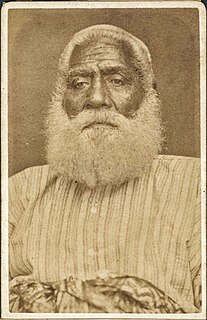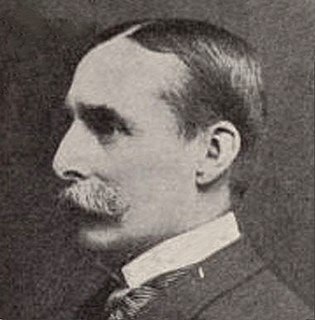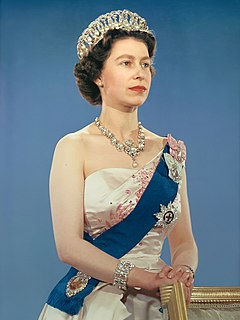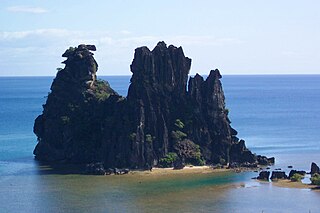Related Research Articles

Fiji, officially the Republic of Fiji, is an island country in Melanesia, part of Oceania in the South Pacific Ocean. It lies about 1,100 nautical miles north-northeast of New Zealand. Fiji consists of an archipelago of more than 330 islands—of which about 110 are permanently inhabited—and more than 500 islets, amounting to a total land area of about 18,300 square kilometres (7,100 sq mi). The most outlying island group is Ono-i-Lau. About 87% of the total population of 924,610 live on the two major islands, Viti Levu and Vanua Levu. About three-quarters of Fijians live on Viti Levu's coasts: either in the capital city of Suva; or in smaller urban centres such as Nadi—where tourism is the major local industry; or in Lautoka, where the sugar-cane industry is dominant. The interior of Viti Levu is sparsely inhabited because of its terrain.

Hindi, or more precisely Modern Standard Hindi, is an Indo-Aryan language spoken chiefly in the Hindi Belt region encompassing parts of northern, central, eastern, and western India. Hindi has been described as a standardised and Sanskritised register of the Hindustani language, which itself is based primarily on the Khariboli dialect of Delhi and neighbouring areas of North India. Hindi, written in the Devanagari script, is one of the two official languages of the Government of India, along with English. It is an official language in 9 states and 3 union territories and an additional official language in 3 other states. Hindi is also one of the 22 scheduled languages of the Republic of India.

Tartar sauce is a condiment made of mayonnaise, chopped pickles and/or relish, capers and herbs such as tarragon and dill. Tartar sauce can also be enhanced with the addition of other varieties of herbs, lemon juice, or olives. It is most often served with seafood dishes such as fish and chips, fish sandwiches, fish fingers, fried oysters and calamari.

Fijian is an Austronesian language of the Malayo-Polynesian family spoken by some 350,000–450,000 ethnic Fijians as a native language. The 2013 Constitution established Fijian as an official language of Fiji, along with English and Fiji Hindi and there is discussion about establishing it as the "national language". Fijian is a VOS language.

The Fijian coups d'état of 1987 resulted in the overthrow of the elected government of Fijian Prime Minister Timoci Bavadra, the deposition of Elizabeth II as Queen of Fiji, and in the declaration of a republic. The first coup d'état, in which Bavadra was deposed, took place on 14 May 1987; a second coup d'état on 25 September ended the monarchy, and was shortly followed by the proclamation of a republic on 10 October. Both military actions were led by Lieutenant Colonel Sitiveni Rabuka, then third in command of the Royal Fiji Military Forces.

Ratu Seru Epenisa Cakobau was a Fijian Ratu and warlord (Vunivalu) who united part of Fiji's warring tribes under his leadership, establishing a united Fijian kingdom. He was born on Natauloa, Nairai Island in Lomaiviti but spent his youth years on Vanuaso, Gau, Lomaiviti. later returning to Bau to re-establish his Father's Ratu Tanoa Visawaqa reign. Ratu Epenisa Seru Visawaqa was given the name "Cakobau" meaning destroyer of Bau returned with most of his warriors from Vanuaso, Gau, Lomaiviti to coup the leadership in Bau then and later takeover his father's title; known after his father as the 6th "Vunivalu" or Warlord of Bau.

Sir Henry Moore Jackson, was a British army officer and colonial governor.

The chief justice is Fiji's highest judicial officer. The office and its responsibilities are set out in Chapter 5 of the 2013 Constitution of Fiji. The Chief Justice is appointed by the President on the advice of the Prime Minister

Makogai is an island belonging to Fiji's Lomaiviti Archipelago. Covering an area of 8.4 square kilometres, it is situated at 17.26° South and 178.58° East. It has a maximum altitude of 267 metres (876 ft). Makogai is visible from Ovalau.

The monarchy of Fiji arose in the nineteenth century, when native ruler Seru Epenisa Cakobau consolidated control of the Fijian Islands in 1871 and declared himself King or paramount chief of Fiji. In 1874, he voluntarily ceded sovereignty of the islands to Britain, which made Fiji a crown colony within the British Empire.

Hienghène is a commune in the North Province of New Caledonia, an overseas territory of France in the Pacific Ocean. It is located on a bay called Hienghène Bay, known for its eroded limestone islets.

Sir George Thomas Michael O'Brien was a British colonial official who served as Colonial Secretary of Hong Kong from 1892 to 1895, and as Governor of Fiji and High Commissioner for the Western Pacific from 1897 to June 1901.

Islam has a high following in Fiji. There are about 60,000 Muslims in Fiji. Muslims in Fiji are mostly Sunni Muslim. In the 1966 Fiji elections, a Suva-based Muslim communal party, the Muslim Political Front, took part. Presently, Urdu is widely taught among Muslim schools for the Fijian Muslims all across Fiji.
Western Fijian, also known as Wayan is an Oceanic language spoken in Fiji by about 57,000 people.
Fiji only began producing its own feature films in 2004, and has produced just one to date. Vilsoni Hereniko's The Land Has Eyes (2004) is set in Rotuma and stars indigenous Rotuman actress Sapeta Taito in her début role, alongside New Zealand actress Rena Owen.
Volia is an extinct monospecific genus of mekosuchine crocodylians from Fiji named in 2002. It was around 2–3 metres (7–10 ft) long. Notwithstanding its comparatively small size, it was probably the apex predator of the Pleistocene ecosystems of Fiji. Fossils of Volia athollandersoni, the type and currently only known species, have been found in the Voli-Voli and Wainibuku Caves of Viti Levu Island. The holotype is housed in the collection of the Museum of New Zealand Te Papa Tongarewa. V. athollandersoni and the other large reptiles of Fiji may have been exterminated by human hunting soon after Fiji was colonized by ancient Polynesians.
The 1980 Fiji rugby union tour of Argentina was a series of matches played between October and November by the Fiji national rugby union team in Argentina.
Apaitia Seru is a Fijian lawyer and former politician and judge, who served briefly as Attorney General of Fiji in 1992. He resigned following allegations that a government payment of US$4 million had been improper. He was also a member of the House of Representatives from 1992 to 1994. He held the Kadavu Fijian Communal Constituency for the Soqosoqo ni Vakavulewa ni Taukei

Possession and consumption of cannabis are currently illegal in Fiji, if charged, the minimum prison sentencing is three months.

Climate change in Fiji is an exceptionally pressing issue for the country - as an island nation, Fiji is particularly vulnerable to rising sea levels, coastal erosion and extreme weather. These changes, along with temperature rise, will displace Fijian communities and will prove disruptive to the national economy - tourism, agriculture and fisheries, the largest contributors to the nation's GDP, will be severely impacted by climate change causing increases in poverty and food insecurity. As a party to both the Kyoto Protocol and the Paris Climate Agreement, Fiji hopes to achieve net-zero emissions by 2050 which, along with national policies, will help to mitigate the impacts of climate change.
References
- ↑ Hames, Alice Inez (1967). Myths and legends of Fiji and Rotuma. Reed. p. 21. ISBN 9787420001213.
- ↑ Mary Saracino; Mary Beth Moser (2012). She Is Everywhere!: An Anthology of Writings in Womanist/Feminist Spirituality, Volume 3. iUniverse. ISBN 9781462064342.
{{cite book}}: CS1 maint: multiple names: authors list (link) - ↑ Williams, Thomas (1870). Fiji and the Fijians. Hodder and Stoughton. p. 202.